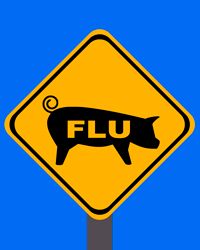With the recent increase in the number of Swine Flu cases in Mexico and the United States, employees are asking what their employers are doing to prevent an outbreak in their workforce. Margaret Kurlinski and Christine Liu McLaughlin suggest lawyers take a common sense approach to advising their clients.

Christine Liu
McLaughlin

Margaret R.
Kurlinski
By
Christine Liu McLaughlin &
Margaret R. Kurlinski  May 6, 2009 – With the recent increase in the number of Influenza A (H1N1) swine flu cases in Mexico and the United States, attorneys are receiving questions from their clients regarding best practices for employers to use when addressing employee concerns about the swine flu and preparing for a potential outbreak in their workforce. When addressing these concerns with clients, we suggest you counsel employers to use a common sense approach, which includes the following.
May 6, 2009 – With the recent increase in the number of Influenza A (H1N1) swine flu cases in Mexico and the United States, attorneys are receiving questions from their clients regarding best practices for employers to use when addressing employee concerns about the swine flu and preparing for a potential outbreak in their workforce. When addressing these concerns with clients, we suggest you counsel employers to use a common sense approach, which includes the following.
Assure employees that the company is monitoring the situation. Employers can find information regarding the swine flu through numerous online sources, including The World Health Organization (WHO) and Centers for Disease Control and Prevention (CDC). Employers should inform employees that the company will take all necessary steps to protect their health and safety.
Review the company’s preparedness plan. Ideally, employers should have a team that is familiar with the company’s preparedness plan. This team should review the preparedness plan and adjust the plan as needed to this particular situation. Employers who do not have a preparedness plan should be counseled to consult recent guidance prepared by the Occupational Safety and Health Administration (OSHA).
Remind employees of good health habits. Employers should encourage employees and their families to take the following steps: cover mouth and nose with tissue when coughing or sneezing; wash hands frequently; avoid touching eyes, nose, or mouth; get plenty of sleep; and drink plenty of fluids. If an employer learns that employees are experiencing any flu-like symptoms, the employer should encourage such employees to seek medical attention immediately and not report to work. Employers may also want to download and circulate the free resources published by the CDC.
Reinforce healthy habits in the workplace. Employers should post reminders throughout the office and work spaces reminding employees of hand washing and other ways to prevent the spread of germs. Employers should fully stock washrooms and other such facilities with tissues, towels, and soap. Employers may also want to work with their cleaning service to schedule more frequent and thorough cleanings of the workplace.
Review pending and planned corporate travel. Both WHO and CDC have issued travel advisories to and from Mexico, which have affected the United States as well as other countries. Employers should review any pending corporate travel and determine whether it is appropriate to suspend such travel.
Review attendance, leave, vacation, and PTO policies. Traditional attendance policies are designed to penalize employees who are absent or tardy. However, if there is a flu outbreak, employers will not want sick or infected employees reporting to work. Accordingly, employers may want to adjust these policies temporarily if a swine flu outbreak does occur and continue to encourage employees to seek immediate medical attention should they experience any flu-like symptoms.
Review and update telecommuting policies. In the event that employers are forced to shut down their business premises, they should be prepared to allow employees to work from home to continue business operations. In conjunction with updating telecommuting policies, employers should prepare backup staffing and production strategies if they are forced to continue operations with a limited staff.
When counseling clients regarding these matters, we suggest practitioners pay particular attention to various employment laws and regulations, including: Occupational Safety and Health Act and regulations; the Wisconsin’s safe-place statute; keave laws such as federal and state family and medical leave acts and regulations; the Health Insurance Portability and Accountability Act; and other laws that govern the collection, use, and disclosure of employees’ medical information, such as the Americans with Disabilities Act and state confidentiality/privacy laws.
For more information, contact Christine Liu McLaughlin, (414) 287-9232 or cmclaughlin@gklaw.com, or Margaret R. Kurlinski, (414) 287-9539 or mkurlinski@gklaw.com, of Godfrey and Kahn’s Labor and Employment Practice Group.
